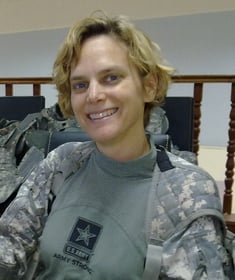Serving in the military and being deployed twice (once to Iraq and once to Afghanistan) profoundly influenced (Retired) Col. Lori Trego’s perspective and her life’s work.
“Nurses see death all of the time, yet we don’t always get the recognition that we were in combat,” says Trego, who worked as a nurse scientist in a Baghdad hospital during Operation Iraqi Freedom among other duties.
As an Associate Professor at the University of Colorado College of Nursing, Trego, PhD, CMN, FAAN, teaches graduate students in the Veteran and Military Health Care Program. In 2015, she retired after 25 years of active-duty service in the U.S. Army Nurse Corps.
A nurse-midwife and research educator with an illustrious military career, Dr. Trego is among the finalists for the Colorado Nightingale Luminary awards. She will be honored along with two other CU faculty in an Aug. 13 ceremony presented by the Colorado Nurses Foundation.
In nomination letters for the Nightingale award, Trego was credited for conceiving and helping to coordinate the first-ever Partnerships for Veteran and Military Health virtual conference in 2021 and coordinating a hybrid conference in April of this year.
As the Deputy Director of the Center for COMBAT Research at the CU School of Medicine, Brig. Gen. Kathleen Flarity, DNP, PhD, CEN, CFRN, FAEN, said the conference was “truly groundbreaking in ways in which the multiple issues were addressed and attendees from academia, clinical practice, and the community were engaged with each other.”
“Even during a pandemic and virtual platform, there was a palpable energy that exuded from both presenters and attendees,” Flarity added in her nomination letter. “I personally, was touched by many of the presentations as a result of this first conference.”
An ongoing nursing/military journey
The conferences gave Trego an opportunity to combine her passion, knowledge, and connections to help address recurring issues that she noticed since joining the military while a college student.
Growing up in rural Pennsylvania, Trego says she knew that she wanted to be a nurse at a young age, though military service was not necessarily among her aspirations.
“Two of the neighboring houses in my block had nurses, and I sort of bonded with those women,” she says. “They were good people doing good things.”

Army Col. Lori Trego was deployed to Iraq and Afghanistan. |
Because Trego’s parents could not afford the out-of-state tuition at her college of choice (University of Delaware), Trego joined the ROTC and accepted a three-year scholarship in exchange for four years of military service. She remained (and thrived) in the military for much of her adult life.
As she rose in rank, Trego says she was able to cultivate a career as an officer and a nurse in the unique environment of military medicine that is based on interprofessional respect.
“Due to military rank, I had opportunities that I might not have had in civilian medical settings -- including leadership positions fairly early in my career,” Trego says. “I grew up as a nurse with a high amount of confidence that ideas that I advanced were not only based on evidence, but people would listen and respect my perspectives. For example, if I’m a captain and a nurse manager and you’re a doctor and you’re a captain, you would have to show respect to me -- and my staff -- while you are on my unit.”
Working to advance inclusiveness in the military
Although her service in the military afforded her many opportunities and experiences that she may not have obtained in the civilian world, Trego saw room for improvement in sex and gender issues and dedicated much of her career to making the military more inclusive and equitable for those who serve.
Historically, Trego says the role of women in the military has been undermined largely because of a rule – rescinded in 2016 – that women aren’t supposed to be deployed in combat zones, even though they were often near or in the line of fire.
“You’re a woman in a man’s world,” Trego says of being a female on active duty. “The feeling that you ‘shouldn’t be there’ kind of pervades the system. There is a stereotype that’s generally negative, but I felt empowered by that great equalizer of rank. I was completely empowered to not feel threatened by that stereotype.”
Unfortunately, such preconceptions and stereotypes regarding women and their place in the military have also created barriers for many women in the National Guard and Reserves and women veterans who remain embedded in the military culture.
Trego’s research over her last nine years of military service focused on active-duty women’s issues during deployment, including reproductive health and mental health. Her research was key in developing a Department of Defense Instruction for providing access to contraceptive care for military women, whether they are deployed or not.
She also helped pioneer the use of a female urination diversion device and pushed for urinary tract infection self-testing kits for women who are deployed.
But the gender disparities became even more pronounced when she retired from the military and entered civilian life.
“When I was in the military, I didn’t know any other way, so to me it was normal,” she recalls. “Out of the military, I saw how bad it really was.”
Life after the military
While Trego continues to serve the military through her research and advocacy work, and through the aforementioned conferences, adjusting to life as a civilian was initially a difficult transition.
“When you take off your uniform, you lose everything. You lose your rank, status, and what you stand for every day you go to work -- which is to protect your nation and the service members that are within that body of the military,” she says. “You have to start all over again and figure out what that means in the academic world.”
Trego, who joined as faculty at the CU College of Nursing in 2016, says she soon discovered the best perk of civilian life was that she could become more of an advocate for veterans and military members than what was allowed while she was in the service.
“The most exciting thing was I could actually approach my elected representatives and say ‘You need to help these people and make legislation that fixes the system!’ I got really into policy and legislative action when I moved to Colorado,” she says. “I learned about policy, health policy, and politics through my experience with Robert Wood Johnson Foundation Health Policy Fellows, and I realized that it’s up to us -- the retirees -- to be those advocates for active-duty women, as I’ve been trying to do all this research for years and years.”
As a Nurse Scholar in Residence for the National Academy of Medicine from 2018-19, Trego focused on social determinants of health that women veterans experience in both the civilian world and the VA system that contribute to health inequities.“One of the women in my study was a Vietnam Veteran who was a nurse and she literally just found out she could get care from the VA,” she says. Stories like those motivated Trego to push for more inclusivity within the VA system.
“I just came into the Army when Operation Desert Storm happened, and there weren’t very many women in the military who had gotten out of combat and were eligible [for VA coverage]. But there was a glut of women veterans since Desert Storm. Many VA hospitals didn’t have basic equipment such as mammogram machines needed for women’s health.”
Trego also was part of an effort advocated for legislation that improved women veterans’ access to critical care and services, that was approved by Congress and signed into law (known as the Deborah Sampson Act).
The Partnerships for Veteran and Military Health conferences came about through the partnerships she established at the Consortium for Veteran and Military Health, which Trego directs. The consortium is a multi-campus effort between academic health institutions, the Veterans Administration, and various veteran and mental health organizations. Its mission is to identify and address issues that face veterans and military members and connect people with resources that could help them.
“I had this vision that it’s not just about the medical community but a holistic approach to veteran or military service members’ health,” she says.
With focuses on building and strengthening networks for veterans, the 2021 and 2022 conferences were widely regarded as successful events. Plans are afoot for the 2023 conference.
Honored by the Nightingale award
Being among the Nightingale Luminaries from Colorado is a great honor, Trego says, but serving veterans is a higher calling.
“I do it all for the veterans,” she says. “It’s nice to know that the Colorado Nurses Foundation values the health of veterans and military members as part of their community. It shows me there’s value not just placed on my work but the whole idea of what we do.”
Along with being an advocate for veterans, being a mentor and educator gives Trego the most satisfaction.
“I could say the most satisfying thing over my 32 years as a nurse has been mentoring other people,” she says. “I love mentoring junior scientists and junior nurses. This is why I still have this ongoing relationship with the active-duty nurses.”


